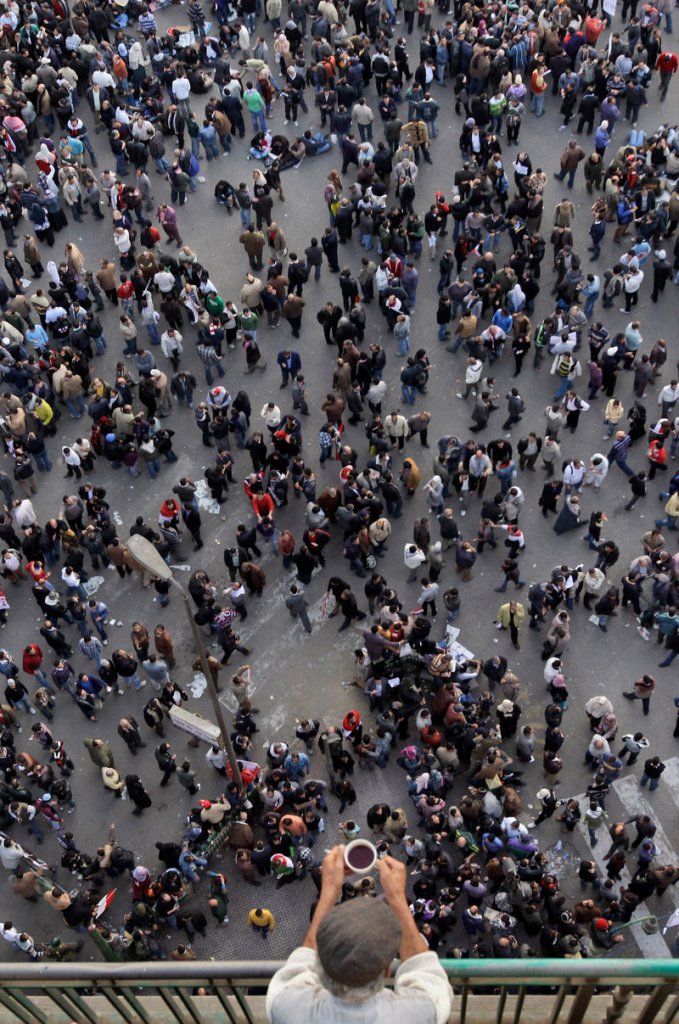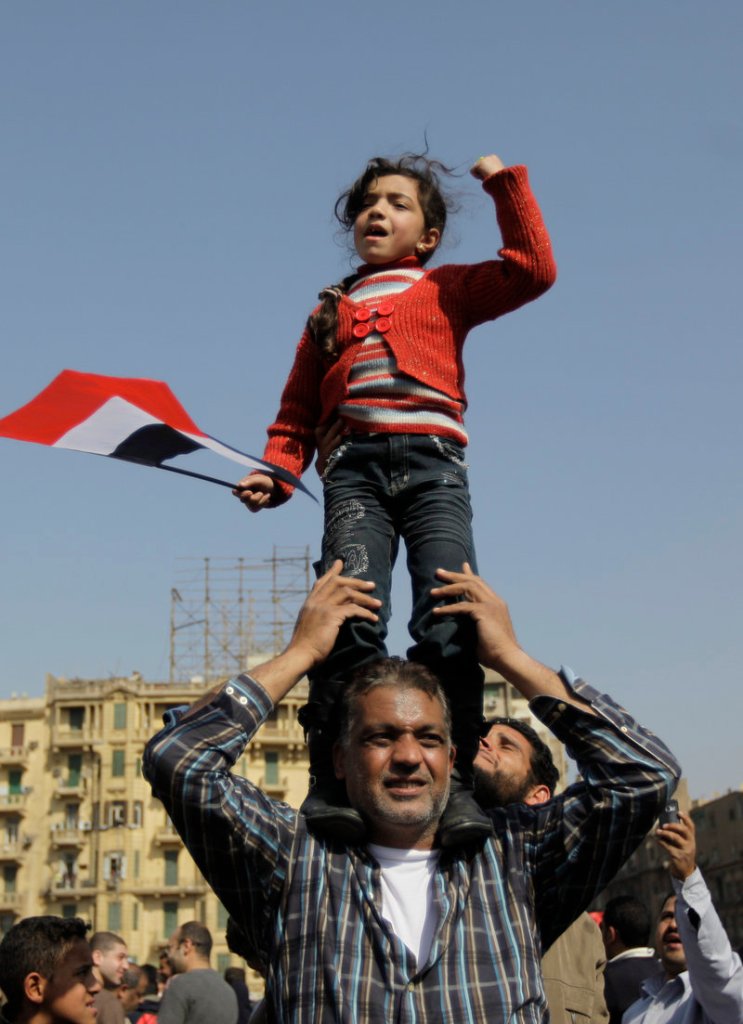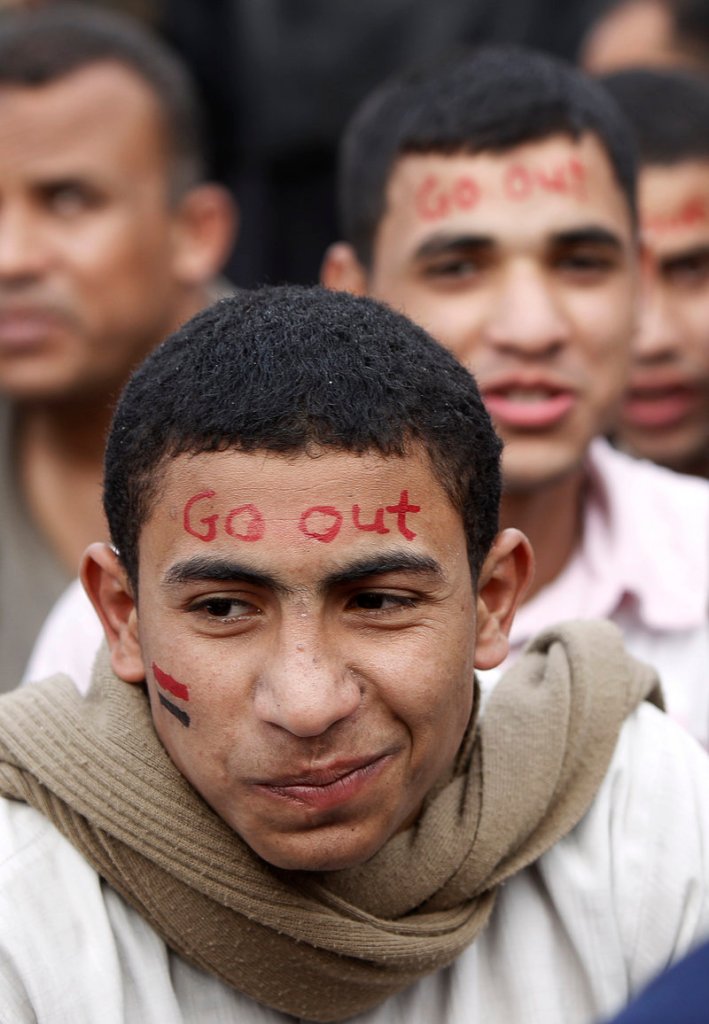CAIRO — Egyptian President Hosni Mubarak announced Tuesday night that he will not run in elections scheduled for fall, speaking hours after hundreds of thousands of pro-democracy demonstrators staged their largest rallies yet to demand that he step aside immediately.
The statement, promising “a peaceful transfer of power,” marked Mubarak’s most significant concession to a public uprising that he said had brought “difficult times” to Egypt. But the gesture was immediately rejected as insufficient by protesters who believe they have gained unstoppable momentum in their struggle to bring an immediate end to Mubarak’s three-decade reign.
“He needs to leave right now. We’ve already waited 30 years, and we don’t want to wait any more,” said Amy Hashem, 23. She was among the thousands of demonstrators who have vowed to occupy Tahrir Square, Cairo’s central plaza, until Mubarak leaves office.
Opposition leader and Nobel Peace Prize laureate Mohamed ElBaradei demanded that Mubarak step down by Friday, and other opposition figures have said that Mubarak’s resignation is a condition for any negotiations with the government.
“It would have been better for him to say, ‘I love my people and I’m leaving,’” ElBaradei said in an interview after Mubarak’s speech. “Unfortunately, this will just extend the period of instability.”
There were indications, however, that Mubarak’s move might prove palatable to some critics. Amr Moussa, a former Egyptian foreign minister, called the announcement “a very important step” that “should be considered carefully.”
Under growing pressure at home and abroad, Mubarak had been left with little room to maneuver. His announcement will set off jockeying among potential successors, including ElBaradei and Moussa, who is now secretary general of the Arab League, as well as other candidates from a broad array of opposition factions, from liberal technocrats to more conservative Islamists.
There were signs Tuesday that the revolutionary spirit that has seized Egypt over the last week was spreading. In Jordan, King Abdullah II fired his prime minister and Cabinet after days of unrest over price increases.
With 80 million people, Egypt is the largest country in the Arab world, and developments here are being followed minute-by-minute by anxious leaders across the region. On Tuesday, leaders could not have liked what they saw.
The demonstration in Egypt was by far the largest since the protests began last Tuesday, and the jubilant mood reflected a confidence among the crowds that Mubarak would soon be gone. The 82-year-old has long maintained his grip here through fear, but there was none in evidence Tuesday, with soldiers smiling as protesters peacefully filled Tahrir Square beyond its capacity and surged into downtown streets.
Protest organizers had vowed to bring a million people to the streets of Egypt, and while reliable crowd estimates were impossible to come by, the turnout was unquestionably impressive. The protests also attracted record crowds in cities across the country, and organizers said a nationwide strike would continue until Mubarak steps down.
In Tahrir, which means “liberation” in Arabic, flag-waving demonstrators held hand-written signs reading “checkmate.” Groups of protesters furiously chanted against the president, their words reverberating across the city: “The pharaoh is finished!”
Among demonstrators, Mubarak’s departure had seemed an impossibility a month ago, and became a whispered hope just last week. But on Tuesday, protesters spoke of it as inevitable and said they are in no mood to compromise.
“The game is over. He can’t save himself any more,” said Mohammed Hussein, 27, a doctor.
The government’s approach to the demonstrations has rapidly shifted. As of last week, protests were banned and the police used every tool in their arsenal to try to thwart them, including water cannons, tear gas and live bullets. More than 100 people died in vicious street clashes.
But when that heavy-handed approach failed, the government called in the army, which for several days remained officially silent about its plans while soldiers showed increasing solidarity with demonstrators. On Monday night, the army issued a statement calling the protesters’ demands legitimate and vowing not to fire on their rally.
On Tuesday, the army stayed true to its word. Military helicopters buzzed overhead and troops worked with civilians to provide tight security, setting up ID checks and frisking stations at each entrance.
Mubarak’s announcement Tuesday night that he would not run followed another major concession Monday, when Omar Suleiman, the newly appointed vice president, said the government hoped to open negotiations with the opposition. Taken together, the moves suggest government authorities are eager for a resolution to a crisis that has paralyzed the nation.
Trading on the Egyptian stock market has been suspended since late last week, and most business has ground to a halt. Shops have shuttered and factory workers have walked off the job. The country’s struggling economy could be devastated if the standoff continues for much longer.
Opposition parties have nominated ElBaradei to negotiate with the government, and ElBaradei has put himself forward as a candidate to lead a transitional authority.
Protesters said Tuesday they were already looking past Mubarak, preemptively rejecting any members of his inner circle — including Suleiman — as their new president. But they have not coalesced behind an alternative, and they have studiously avoided associating with any candidate or party, saying Egypt first needs to settle on a plan for holding fair elections.
Presidential elections were already scheduled for September, although under Mubarak they have been heavily rigged.
Protesters continued Tuesday to demand that the United States take a more vocal role in supporting their movement. They say fears of an Islamist takeover of Egypt are vastly overblown, and emphasize that the nation’s minority Christian community has been heavily involved in their movement. Although members of the Muslim Brotherhood, the nation’s best-organized opposition group, have turned up at the protests in greater numbers in recent days, the group is hardly driving the demonstrations.
“Washington has been very anxious about what’s happening here, but it shouldn’t be. It should be happy,” said Mohammed Fouad, 29, a software engineer. “This will reduce terrorism. When people have their voice, they don’t need to explode themselves.”
Send questions/comments to the editors.





Success. Please wait for the page to reload. If the page does not reload within 5 seconds, please refresh the page.
Enter your email and password to access comments.
Hi, to comment on stories you must . This profile is in addition to your subscription and website login.
Already have a commenting profile? .
Invalid username/password.
Please check your email to confirm and complete your registration.
Only subscribers are eligible to post comments. Please subscribe or login first for digital access. Here’s why.
Use the form below to reset your password. When you've submitted your account email, we will send an email with a reset code.